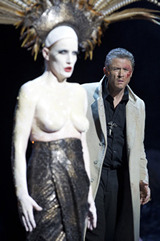| Opera Reviews | 28 April 2024 |
Nürnberg begins a new Ring cycleby Tony Cooper |
|
| Wagner: Das Rheingold Staatstheater Nürnberg December 2013 |
|
|
This time round the cycle is being directed by Georg Schmiedleitner with the Staatstheater's relatively new Generalmusikdirektor, Marcus Bosch, conducting his first Ring. The Ring cycle demands a lot from the performers, musicians and creative team, but the final result here clearly demonstrated a passion for and commitment to Wagner. Schmiedleitner's direction kept the opera flowing as fast as the great Rhine itself and Alfred Mayerhofer's finely detailed costumes were highlighted by bold rich colours. For instance, Froh's bright orange-coloured socks identically matched Fricka's slim-line belt. The set design by Stefan Brandtmayr was equally amazing, simple but effective, with the Rhine represented by hundreds of used and discarded plastic water containers radiating the message of the wastefulness of contemporary society in economic and ecological terms seen in stark contrast to Wagner's epic cycle depicting the end of the world. What happens after? What, indeed! The trio of Rhinemaidens - Hrachuhí Bassénz (Woglinde), Leah Gordon (Wellgunde) and Judita Nagyová (Flosshilde) - gave a thrilling and effortless performance singing with utmost ease while encountering some difficult stage directions not least by ascending and descending a flight of steeply-inclined stairs to a water-bottling plant draining the natural resources of the Rhine. Blonde bombshells and strikingly resembling a close-harmony singing act (The Andrews Sisters spring to mind), they were attired in pastel-coloured sparkling pink, blue and green dresses and played and teased poor old Alberich to distraction sung in crude and awkward fashion by Antonio Yang - a house favourite by all accounts. Forceful and cunning and dressed in an untidy black suit wearing a white T-shirt sporting heavy black-rimmed spectacles, his costume accentuated the ugly and unpleasant side of his character. He cracked the whip (literally) treating Mime (Hans Kittelmann) - outstanding in his role - to a good blow beneath the belt while violating the Rhinemaidens at whim. The giants Fafner and Fasolt - authoritatively sung by Nicolai Karnolsky and Taehyun Jun - treated Freia (Michaela Maria Mayer) as badly. She put in a gallant performance that fitted perfectly her role while her entrance on stage was as dramatic as I've ever seen. Dressed in bridal fashion with a transparent long-flowing white dress her frightened expression spoke volumes of the plight she found herself in. Roswitha Christina Müller (Fricka) also put in a gallant performance possessing a strong clear voice complementing well that of Randall Jakobsh as Wotan. She was solid as a rock standing up to him with his lofty ideals on sharp high heels frowning upon his extramarital affairs while standing up for her sister in her time of need. The role of Loge, in so many ways a gift of a part, was portrayed well by Vincent Wolfsteiner who had schoolboy glee written all over his face when tricking Alberich into changing into a frog and stealing the Tarnhelm. Javid Samadov shone as Donner, taking over the role at short notice from Martin Berner while David Yim's Froh was delivered with great tenderness and care. And when Erda - sung by Leila Pfister - arrived to warn Wotan of the dangers that lie ahead she was adorned in a striking long-feathered headdress and would have not looked out of place on a Parisian catwalk. Not only did she look good but her rich voice was hauntingly beautiful and well controlled. As Donner wielded his hammer Valhalla came clearly into view represented by long white strips of vertical neon lighting while Maestro Bosch set the orchestra alight with the big number, The Entry of the Gods into Valhalla. Before the heavenly journey, though, Fricka abruptly dumps down a wedding cake at the feet of the Rhinemaidens designed in the form of a classical Greek temple (Valhalla!) presented to Wotan by Fafner when negotiating the terms of Freia's destiny. She then joined her husband leading the gods across the earthly valley to their new heavenly home leaving Loge behind to return to the ordinary world in his normal form, that of fire. And with the faint cries of the Rhinemaidens lamenting the loss of the gold you know that there's trouble ahead. A full cycle comes round in 2016. |
|
| Text ©
Tony Cooper Photo © Ludwig Olah |

 In
this bicentenary year Ring cycles have sprouted up practically everywhere
in the world where there is an opera house of standing, and therefore
Nürnberg's cycle was more than welcomed by local Wagnerites as it is
the first one they've been treated to since Philippe Auguin's offering
of 2002 which he took to Beijing three years later, the first full cycle
ever seen in China.
In
this bicentenary year Ring cycles have sprouted up practically everywhere
in the world where there is an opera house of standing, and therefore
Nürnberg's cycle was more than welcomed by local Wagnerites as it is
the first one they've been treated to since Philippe Auguin's offering
of 2002 which he took to Beijing three years later, the first full cycle
ever seen in China.





